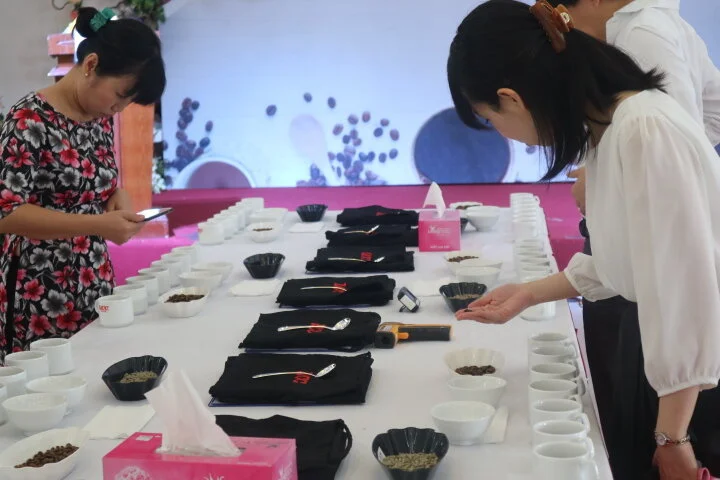It's Complicated
RANT POTENTIAL, although I’ll do my best to avoid simple venting…
People from all over the coffee world contact me with questions about Vietnamese coffee. Often, I notice a lot of assumptions built into the questions, usually about how straight-forward or simple things should be, that one could just approach a retail shelf on aisle 8 and choose the coffee they’d like to buy now and it would be delivered, as requested, in 7-10 business days with minimal cost. Wow, that sounds dreamy. To me it sounds like the Global North’s spot buying experience. With many, this turns out to be the first time they’ve tried to buy coffee without an importer’s assistance and I end up wishing I’d created a template email with a list of importers for their region. Not that I don’t enjoy being helpful - it just takes up a lot of time. Brokering relationships is the work of a sales specialist or aggregator, and going the scale of micro is quite a lot of work for so little return. Maybe this is a potential role I should create for myself, if I could just figure out how to make it financially viable. Otherwise it feels reasonable for me to expect to continue doing a lot of unpaid footwork for strangers on the internet.
But, on the other hand, it’s been a great way to meet people and to get a feel for what demand and curiosity for Vietnamese coffee exists out there. I’ve made contacts with people from places I’d only ever heard of, gaining ever more insight into what’s happening for coffee in each of these places, learning that the Specialty Coffee movement has in fact touched nearly every corner of the globe. My perspective has expanded more than I can track, and I feel that I have benefitted in more ways than I could have planned. There’s a time for everything, though, and perhaps this phase is the first bit of collected data for me to create a new way to engage, or maybe I’ve just got to keep collecting data.
I get it. Specialty Coffee rewards scarcity, novelty, exclusivity, and people are always seeking out things that none of their peers or competitors have. They’re looking for their “edge,” whether toward further expanding the variety of their offerings list, or bolstering their approach to roasting and buying, or bringing novelty to the experience of being a customer in their cafes, or any of the various ways this constant seeking expresses itself in the marketplace. For some, their edge is found in exploring unconventional origins. If they can get in with someone early enough, they’ll have the advantage. So it makes sense that people representing operations of all shapes and sizes would be grasping at straws to contact me and get connected with a producer, like, right now. I’m not a trader or broker, and I don’t export green coffee. I don’t even buy much of it. But for some reason, I’m the guy.
Exporting coffee is a huge job. The amount of sample vetting needed, the logistics coordination, the planning (and plan adjustments), the working capital it takes just to secure contracts - it becomes full time work to move any amount of coffee for very slim margins. It becomes necessary for them to move volume. There are already very skilled and experienced sources in operation in the major regions of Vietnam. They aim for volume, consistency, and exactness of specification. More recently, they’re interested in learning more about the specialty market, about the potential demand, import potential, craft roasting, espresso blends, and all the learning that the “third wave” movement brought. So, perhaps this industry will evolve into a more diversified and quality-stratified one, where one could find any level of quality and volume they’re seeking, purchased through someone with the bandwidth, product, and professionalism to satisfy these needs. These are the people that one should get in touch with if one really wants to get started in this region. These traders have knowledge of the region, of all the machinations of moving commodities within and out of the country. Those who connect to these folks will be in much better long term shape, running into fewer snags and the dozens of other possible hiccups that will inevitably affect every small shipment moved independently (the hard way). Even if traders here can’t guarantee microlot quality (yet), their areas of expertise are indispensable and will make the buyers’ experience much less troublesome. The main hurdle I see here is volume - these traders are used to moving containers (hundreds per year), and the majority of the buyers who contact me are nowhere near this amount, usually inquiring after a couple of bags for the year.
Finding someone who is willing to give the time necessary to guarantee quality for tiny tiny lots is the challenge. This is the part where I advocate for the importer, sending people to those who are doing this work around the world to create a selection of coffee for roasters in their markets. An importer would be able to collect enough to fill a container or few and offer hassle-free purchasing experiences. Working with them, with the understanding that one can start making requests for unique lots and single-producer separations as the relationship grows, will help to engender trust and faith in the effort. To start that process, though, the buyer will have to accept a coffee that may qualify as specialty but won’t immediately meet the exceptional quality demands that specialty buyers tend to require. This is a multi-year, multi-step process that requires trust in those who fill these roles to do a good job on one’s behalf. It requires a groundswell of players who really do want to have a positive impact on an emerging specialty origin, more than just claiming the three bags of excellent coffee at the expense of those who have to find a home for the rest of the crop.
Of course all of this learning takes time, and I often find myself advocating for patience and a more long-term mindset with the inquirer. Building relationships takes time - year after year of checking in, face-to-face time, troubleshooting and problem solving, and connecting with others who may be of some use.
We’re still in the early stages of a steep learning curve, with just a few years into awareness of the specialty and premium markets, not to mention operation in this area. It’s an exciting time to be involved with people in this position, but it also requires lots and lots of work. And mistakes, missed connections, failed crops and shipments, changing realities. All of these things are necessary to move an industry forward.
Connecting with the right people, at the right time, and being willing to put in the work without guarantees of an immediate payoff is necessary. Are you willing to share the risk and effort?


